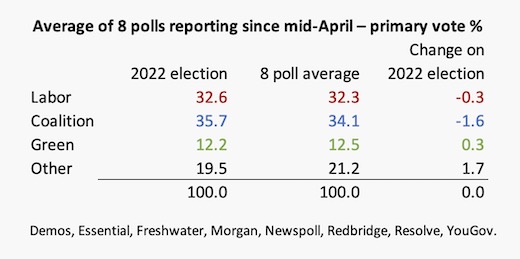Polls
William Bowe’s Bludgertrack
At the end of last week Labor’s lead in Bludgertrack was 53.0:47.0. It has moved around over the week, but by yesterday morning it was again 53.0:47.0. In comparison with the 2022 election Labor’s primary vote is down by 0.1 percent, the Coalition’s is down by 2.3 percent, and the Greens’ vote is up by 0.1 percent.
The average of the most recent 8 polls, including a comparison with the 2022 election, is shown in the table below. This does not include the final last-minute Newspoll.

Although the poll numbers used to construct this table are as reported on Poll Bludger, the results are a little different. Bowe uses more sophisticated methods, weighting results by the numbers polled and giving more weight to recent polls, but the results are pretty much the same, apart from a difference in the Coalition primary vote. This probably because later polling is showing a poorer result for the Coalition than earlier polling.
Bowe also shows One Nation’s vote at 7.9 percent, up 2.9 percent on 2022.
This may indicate that the Coalition is losing to One Nation. But it could also indicate a shift in the far-right vote from Palmer to One Nation because their support bases would have considerable overlap. In the 2022 election the combined One Nation plus UAP vote was 9.1 percent (5.0 percent + 4.1) percent. As far as polls can measure at a low level, support for Palmer’s Trumpet is between 1 and 2 percent (they are probably all advertising agents). Say 1.5 percent. That brings the far-right vote up to 9.4 percent. That’s very little change.
Other polling reported on Poll Bludger shows that Albanese is still extending his lead over Dutton as preferred prime minister, and that his net approval rating (approval minus disapproval), although negative in some polls, is still much better than Dutton’s.
The media are running stories about “soft voters”, suggesting that they could swing the election either way. But that effect is overstated. There are probably two big camps of soft voters – a Coalition/One Nation/Trumpet camp and a Labor/Green/Independent camp, who will make up their minds as they walk into the polling station. Movements within these camps will have little effect on the outcome.
The TAB payouts on a $1.00 bet (Friday morning): Labor $1.07, Coalition $9.00, Labor majority $1.46, Labor minority $2.90, Coalition majority $34.00, Coalition minority $10.00. Notably in the last few days the odds of a Labor majority have shortened while the odds of a Labor minority have lengthened. (My own view is that betters are too influenced by the TPP figures, but I may be proven wrong.)
Preferences
Optimists in the Coalition camp are claiming that they are getting much better preference flows from the far-right parties than they were in 2022. That may be so because the electorate is more polarized and there is a Trumpian coherence between the Coalition and the parties on the far right. But on his Poll bludger site Bowe points to evidence that this effect is small.
Support for One Nation tends to be strongest in electorates that are comparatively safe for the Coalition, mainly in non-metropolitan regions. But in 2022 there was also strong support for One Nation in some outer-suburban regions, once solid ground for Labor but now contestable. These include the former manufacturing regions of northern Adelaide and northwest Melbourne – the closest we have to a rustbelt – often with concentrations of migrants who came in the postwar migration boom and their descendants. In outer-suburban regions with concentrations of more recently-arrived migrants the parties on the far right have not done so well.
Also on preferences Crispin Hull has a post Bizarre preference decisions, pointing out that the Greens’ decision to preference independents over Labor could be decisive, costing the Coalition seats but not benefitting Labor, making a minority Labor government more likely.
At the same time the Coalition is putting Labor ahead of the Greens and independents in some seats. In those few seats where Coalition preferences are distributed, that makes a Labor majority government more likely than a Labor minority government, but as Hull explains, from a Coalition perspective this is not as stupid as it first appears:
Maybe the Liberals would prefer a majority Labor government to a minority Labor government because a Labor minority Government would be forced into doing all sorts of sensible things on the environment, energy, political donations, and integrity – things the Liberal Party is not interested in.
The Senate
Missing from all these polls is anything much on the Senate.
The ABC has an informative website on senate candidates, which includes an explanation of Senate voting.
As at present the Senate will be finely balanced, and because only half the Senate (apart from ACT and NT Senators) are up for re-election its composition in terms of party membership is unlikely to change much. There will still be a number of Senators acting essentially as independents.
Even though it would have more Senate seats than Labor, a Coalition government would find it harder to get legislation through the Senate than Labor, but there is no guarantee that Labor would find the new Senate any easier than the old one.
Continuing Senators
Three Senators who left their parties are continuing. These are Senators Lidia Thorpe (Independent, Victoria, ex Greens), Tammy Tyrrell (Independent, Tasmania, ex Jacqui Lambie Network), and Fatima Payman (“Australia’s Voice”, Western Australia, ex Labor).
Senator Ralph Babet (Victoria) was elected as Palmer’s UAP Party; that party no longer exists but he continues to hold his seat. Pauline Hanson (Queensland) continues.
Up for election
Two others who left their parties – Senators David Van (Victoria, ex Liberal) and Gerard Rennick (Queensland ex LNP) are up for election, but their chances are slim.
By contrast Senators Jacqui Lambie (Tasmania) and David Pocock (ACT) are almost certain to be returned. Both have the benefit of representing small jurisdictions. Malcolm Roberts (Queensland, One Nation) will probably be re-elected.